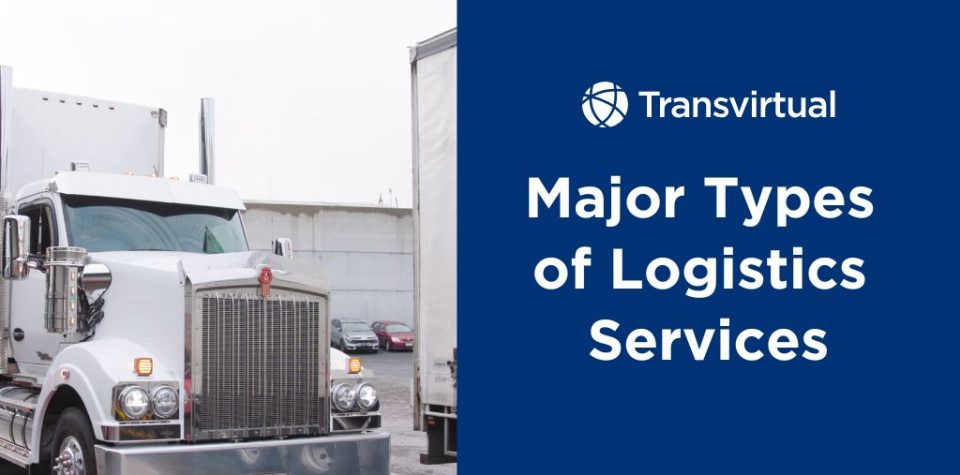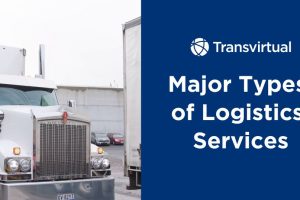Table of Contents
There’s a good chance your particular business doesn’t need its own full-blown logistics empire. You might just need a couple of extra hands from logistics companies helping you get your parcels out the door. But other businesses – the ones managing international freight, inventory forecasting, dock scheduling, and more all before lunch – can’t do without one.
Logistics simply isn’t a one-size-fits-all kind of deal. There are multiple layers to it, where each service solves a different problem depending on how your business moves its goods. Whether that’s shipping pallets across borders or running small packages across town, you have to understand your options first.
With tools like a transportation management software, each of these services becomes part of a nimble, flexible, tech-driven system you can scale and tweak as you see fit. So let’s discuss the major logistics service types and which ones you’ll need for your business.
What are Logistics Services?
Definition and Role in Business Success
Logistics services help businesses move goods efficiently from one place to another. They make sure products reach customers on time, in good condition, and at the lowest possible cost. By coordinating different teams and processes, logistics services simplify the complex task of transporting goods.
Benefits of Logistics Services
The primary benefit of utilizing logistics services is the significant cost savings they offer. By streamlining the supply chain process, businesses can reduce expenses related to transportation, warehousing, and inventory management.
Improved efficiency is another major advantage, as logistics services help manage inventory levels across multiple locations or warehouses, ensuring that products are always available when needed.
Enhanced customer satisfaction is also a key benefit, as timely and accurate deliveries lead to happier customers and repeat business.
Third Party Logistics (3PL)
3PLs make it possible for you to keep your business operations lean without sacrificing scale. Just outsource your logistics needs to a third party provider – warehousing, transport, inventory management, etc.
Businesses love 3PLs for a few good reasons:
Cost control: You only pay for what you use. That means no massive investment upfront for a fleet or warehouse.
Flexibility: Scale your business up during peak seasons, scale down when things go slow.
Know-how: A 3PL will know freight inside and out. They’ll have a carrier network, understand compliance, and may even negotiate better rates on your behalf.
3PLs are really popular with ecommerce companies, fast-moving consumer goods businesses, and any others looking to expand to new regions. And with a proper TMS that connects your in-house team to the 3PL’s systems, you’ll bridge any gaps and get real-time data for you and your customers.
Freight Forwarding
If you move cargo long distances using multiple carriers, within a single country or across international borders, you’ll love freight forwarding services.
Freight forwarders aren’t carriers – they don’t own the trucks or planes. They instead coordinate the movement of your goods throughout the journey by booking space with carriers, handling customs, managing documentation, and guaranteeing your shipments clear checkpoints.
Freight forwarding makes sense if you:
Deal with international imports and exports
Need multimodal transport (sea, rail, truck)
Require assistance with regulatory compliance
You can think of them as logistics translators. They’re fluent in shipping codes, freight classes, customs documents, carrier lingo, etc. Freight forwarders are basically specialized logistics providers that focus on the transportation of goods across borders or overseas.
The best freight forwarders have relationships with carriers and warehouses around the planet and give you far more options and better service. Partnering with a reliable logistics partner can further enhance operational efficiency and customer satisfaction.
Definition and Process
Logistics services encompass a wide range of activities, including transportation, warehousing, inventory management, and supply chain management. The process typically begins with the collection of goods from the supplier or manufacturer. These goods are then transported to a storage facility or warehouse, where they are managed and tracked using advanced inventory management systems. This ensures that products are always accounted for and can be delivered to customers in a timely manner. By integrating these services, businesses can achieve a seamless flow of goods from the point of origin to the final destination.
Benefits of Using a Freight Forwarder
Partnering with a freight forwarder can offer numerous benefits to businesses. One of the most significant advantages is cost savings, as freight forwarders negotiate rates with transport companies and can consolidate shipments to achieve economies of scale.
Time savings are another key benefit, as freight forwarders handle the entire process, from booking space with carriers to managing documentation and customs clearance. Their expertise in regulatory compliance and international shipping ensures that goods move smoothly and efficiently through the supply chain. By leveraging the services of a freight forwarder, businesses can navigate the complexities of global trade with ease and confidence.
Warehousing and Storage
From outside the logistics world, warehousing sounds simple. You’re just placing your goods in containers in a big building until they’re needed, right? Of course, there’s a ton more strategy involved.
Just outsource your logistics needs to a third-party logistics service provider – warehousing, transport, inventory management, etc. Modern warehouses function like complex command centers more than mere storage units. They have real-time inventory systems, climate-controlled environments, integrated fulfillment stations, and tight coordination with transportation networks.
What matters most with warehousing and storage includes:
Location: You want your warehousing to be as close as possible to both your business and your customer base to trim delivery times and costs.
Inventory visibility: It’s nice to always know what’s on the shelf without having to enter the building.
Scalability: The best warehousing partners can absorb shocks from seasonal spikes, flash sales, downturns, and more.
And if you can integrate your warehouse’s systems with your TMS or warehouse management system (WMS), your warehousing strategies can dramatically enhance your efficiency. Automating replenishment, syncing with outbound delivery schedules, and keeping your service levels consistent no matter what’s going on in the background.
Courier Shipping
If you need to send something across town as soon as possible, courier services are often your best option. They’re fast, localised, and used to operating in tight delivery windows. Any growing B2C enterprise should get used to using a courier service, and B2B benefits from them too.
Next-day delivery is pretty much the standard, but same-day delivery has become more and more common. Courier operations enable this, but they rely on:
Proof of delivery (PoD) technology
Driver communication tools
This means if you want to make your life and the lives of your courier service providers that much easier, you’ll need a proper system behind the scenes. Otherwise, organising with a courier fleet could become a scheduling nightmare. With the right TMS, you can streamline dispatching and driver routing and gain live tracking and delivery confirmation.
Cargo Handling
99.99% of freight items eventually touch human hands. This can be at hubs, terminals, depots, etc. Cargo handling is about the safe and efficient loading, unloading, sorting, scanning, and preparing of all that freight for its next movement.
Efficient management of raw materials is crucial for maintaining smooth production processes and inventory levels.
The little details involved in cargo handling can affect nearly every other component of the supply chain. If shipments are damaged, it’s probably due to poor cargo handling. If your shipments run into delayed turnarounds at terminals, it’s probably tied to poor coordination during cargo handling. If pallets are misrouted, chalk it up to bad labeling or scanning errors during the handling process.
Cargo handling itself isn’t the most glamorous part of the logistics effort, but it’s among the most critical. And because of just how much data goes in and out of the process (barcode scanning, dock scheduling, electronic documentation), it’s smart to combine this traditional labor practice with modern logistics tools.
In-House Logistics
A significant number of businesses prefer to handle their logistics processes on their own. They own their trucks, warehouses, and manage their own transportation staff. This is in-house logistics, which gives exceptional control over everything but poses its own challenges.
If you run your own logistics operation, you might feel empowered overall. But you also have to master:
Fleet maintenance
Fuel cost volatility
Route planning
Staff scheduling
Regulatory compliance
The reason why so many companies handle their own logistics is because of the reduced margin for error. But to succeed, you’ll need to have everything dialed in – dispatch times, inventory sync, delivery accuracy, etc. Even the most successful, strategically brilliant in-house logistics teams rely on powerful software tools to keep things running smoothly. With a TMS, you can automate your manual processes, reduce admin time, and gain clarity on where your freight is and where it’s headed.
Inventory Management
You might have the best warehouses, the fastest couriers, and be part of a globe-spanning freight network. But if your inventory falls out of sync, everything can end up in shambles.
Proper inventory management keeps everything running smoothly in almost every other logistics service. It helps everyone in the supply chain know exactly what’s in stock, the location it’s stored in, and when it needs to move. It also helps you forecast demand so you don’t have a ton of inventory left over after the ordering’s finished – or worse, run out when demand suddenly spikes.
Any small error in inventory management can snowball. A missed reorder can lead to delayed fulfillment. A stockout can lead to a lost sale. And an overstock can create wasted storage space and a loss of cash.
Inventory management used to be a back-office spreadsheet operation. In recent years, it’s become a real-time, multi-location, automated process thanks to advanced software systems. You can sync your inventory up to your transport software and scanning tools – even your customer ordering platforms. As long as you have a high-performing TMS/WMS, you’ll benefit tremendously from fewer inventory management issues.
Choose Logistics Services that Fit Your Business
Success in transporting your goods requires one, multiple, or even all of these types of logistics services working in tandem. It just depends on your business – if you’re a last-mile delivery company, you’ll need different services than an international distributor. What matters is that you figure out which services make sense for your operation and that they work together well with you and one another.
If you’re ready to connect the dots between these disparate logistics solutions and your business, you’ll need a high-quality TMS to streamline the process and keep it running smoothly. Schedule a FREE 10-minute strategy call with the team at Transvirtual today to figure out how we can help you get it done.

